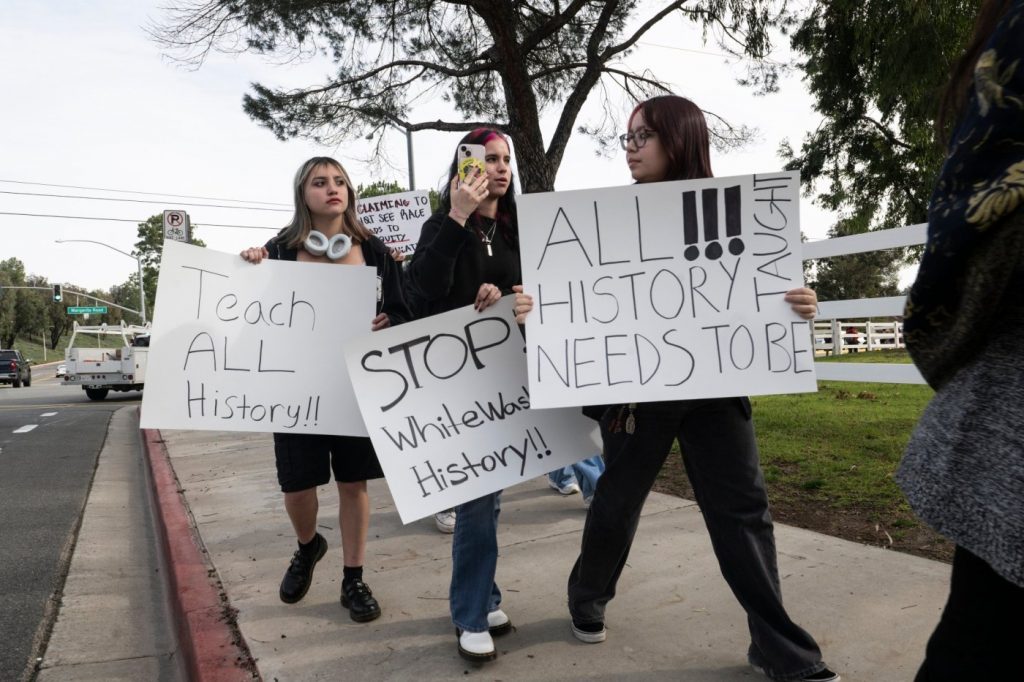A judge won’t block Temecula schools’ critical race theory ban and transgender notification policy.
Riverside Superior Court Judge Eric Keen on Friday morning, Feb. 23, denied requests for court orders seeking to stop the Temecula Valley Unified School District from enforcing the two controversial policies. Keen did not elaborate on his ruling during the court hearing.
Last week, Keen ruled the lawsuit, described as a groundbreaking challenge of a critical race theory ban, could move forward.
The lawsuit, filed in August, challenges a resolution approved on a 3-2 vote by the Temecula Valley school board in December 2022 that banned the teaching of critical race theory.
Board members Joseph Komrosky, Danny Gonzalez and Jen Wiersma, elected in 2022 as what was then a Christian conservative majority on the five-member board, voted in for the ban. Board members Allison Barclay and Steven Schwartz, who have often opposed initiatives of the board majority, voted no.
At the time, Gonzalez, Komrosky and Wiersma contended that critical race theory was too divisive for the classroom and teaches a victim mentality to students.
Critical race theory is defined by academics as a legal framework designed by scholars in the 1980s that explains how structural and racial disparities persist in American society.
Public Counsel, which sought the court injunction, said Temecula teachers “are self-censoring to avoid using the word ‘white’ when discussing subjects like Jim Crow segregation and European imperialism, and restricting their answers when students ask about anti-Black violence.”
“Forbidden from fully discussing racial oppression, Temecula’s educators have no way to accurately and supportively guide their students in difficult but necessary discussions of topics including slavery, segregation, colonialism and immigration,” argued Public Counsel, a self-described nonprofit public interest law firm.
Related Articles
Woodshop has been disappearing from California schools for decades. Here’s why one Bay Area teacher is bringing it back.
Judge: Texas school legally punished Black student over hair
Electric school buses are gaining traction in Bay Area schools
California high school student has ‘cognitive’ issues and never planned school attack, attorney says
Parents demand answers after California substitute teacher’s alleged behavior leaves class in tears
During a Feb. 16 court hearing, the school district’s attorney, Mariah Gondeiro of the Murrieta-based Advocates for Faith and Freedom, argued that the lawsuit is overly vague and attempts to penalize board members for performing their elected duties.
The lawsuit filed in Riverside Superior Court was later amended to challenge a district policy, passed by a 3-2 board vote in August that requires district officials to tell parents if their child identifies as transgender.
Supporters said parents have a right to know that information. Critics warned it could lead to students being abused or kicked out of their homes by parents who don’t accept their child’s gender identity.
The district’s transgender policy mirrors that of Chino Valley Unified School District’s and policies passed by the Murrieta Valley and Orange school boards.
California Attorney General Rob Bonta sued Chino Valley, and a judge last September granted Bonta’s request for a temporary restraining order to block that district from enforcing its policy. In the Temecula case, in which the district’s policy is based on Chino Valley’s, Keen made the opposite ruling.
Friday’s ruling comes as the district prepares for a June 4 recall election of Komrosky, whose foes collected enough voter signatures to put a recall on the ballot.
Regardless of the recall’s outcome, it’s unclear whether the board’s conservative majority will return following Gonzalez’s December resignation. A special election to fill his seat will take place after the four remaining board members failed to reach consensus on a replacement.


